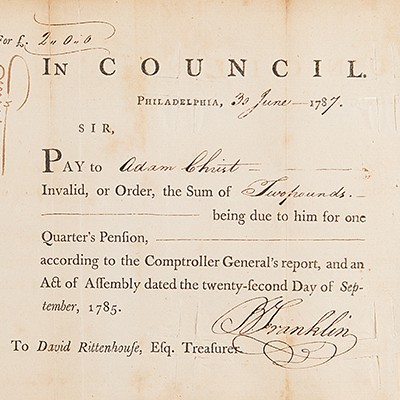William Wilberforce Autograph Letter Signed
Two ways to bid:
- Leave a max absentee bid and the platform will bid on your behalf up to your maximum bid during the live auction.
- Bid live during the auction and your bids will be submitted real-time to the auctioneer.
Bid Increments
| Price | Bid Increment |
|---|---|
| $0 | $5 |
| $50 | $10 |
| $200 | $25 |
| $500 | $50 |
About Auction
Jan 10, 2024
RR Auction support@rrauction.com
- Lot Description
British politician, evangelist, and philanthropist (1759-1833) who played an important role in the movement to abolish slavery. ALS signed “W. Wilburforce,” three pages on two adjoining sheets, 7.25 x 9, April 17, 1789. Addressed from London, a handwritten letter from William Wilburforce to an unidentified recipient, in full: “A letter was put into my hands the day before yesterday relative to the proposed application to parliament for the repeal of the corporation and test acts; it is signed by Mr. Beatson as chairman of the meeting but as there is no date or either of place or time, observing together with the names of some others of your family, or of my friend that your signature is affixed to it. I think it best to address my reply to you, to which I confess I am strongly incited by the consideration that I can speak to you on this as on any other subject with perfect frankness, and without danger of offence, or misconstruction: at the same time, if you think I had better return an answer to Mr. Beatson directly than thro' you, I beg you will tell me so, and I will do it without delay. Remember only you must inform me where to direct to him, and in the meantime secure me the credit of wishing to treat the application in the most respectful manner.
What I have to say shall be comprised in few words indeed. I rather rejoice that I have not leisure to enter into that full discussion of the business in question, without which in a matter of this importance and extent it is better not to discuss at all. Few topics, if any, have been agitated in Parl't which have been productive of more uneasiness than this: when it was last brought forward, I considered it in all its bearings, and at last, tho' with extreme reluctance and concern, I found myself compelled to resist the dissenters' application; the only point of consequence I think in which my worthy colleague and myself ever differed. The application is not I find to be resumed: I know you too well not to be sure you would esteem me unworthy of the situation I hold if I were capable of suffering my conduct in a case of this magnitude to be influenced by any considerations of parliamentary interest, or personal gratitude: I will speak openly to you: I trust, which way so ever I shall decide, I shall continue to enjoy the good opinion and support of you and your family: yet were I sure these were at stake, I would not suffer them to weigh a feather in the balance. The Protestant dissenters have a right to require of me (and their claim comes strongly enforced by your joining in preferring it) that I should carefully reconsider the affair. This I will do with all seriousness and impartiality: no mistaken notions of consistency shall operate with me, but I will ponder and review the question to the best of my judgment, and act according to the dictates of my conscience. More I am persuaded you will not ask - tho' as what I have written will have abundantly testified, I am a good deal pressed in point of time, I cannot lay aside any pen without congratulating you on his majesty's recovery. I recollect few events wherein the hand of a gracious providence has been more plainly to be seen. I beg my best remembrances to all friends, and I remain always yours.” In fine condition. - Shipping Info
-
Bidder is liable for shipping and handling and providing accurate information as to shipping or delivery locations and arranging for such. RR Auction is unable to combine purchases from other auctions or affiliates into one package for shipping purposes. Lots won will be shipped in a commercially reasonable time after payment in good funds for the merchandise and the shipping fees are received or credit extended, except when third-party shipment occurs. Bidder agrees that service and handling charges related to shipping items which are not pre-paid may be charged to a credit card on file with RR Auction. Successful international Bidders shall provide written shipping instructions, including specified Customs declarations, to RR Auction for any lots to be delivered outside of the United States. NOTE: Declaration value shall be the item’(s) hammer price and RR Auction shall use the correct harmonized code for the lot. Domestic Bidders on lots designated for third-party shipment must designate the common carrier, accept risk of loss, and prepay shipping costs.
-
- Buyer's Premium



 EUR
EUR CAD
CAD AUD
AUD GBP
GBP MXN
MXN HKD
HKD CNY
CNY MYR
MYR SEK
SEK SGD
SGD CHF
CHF THB
THB




